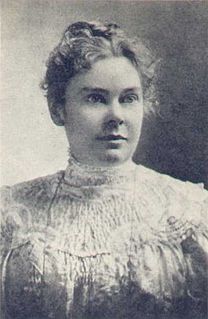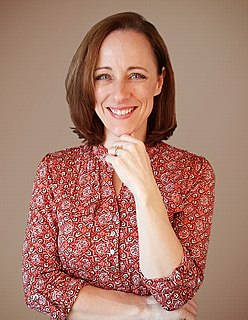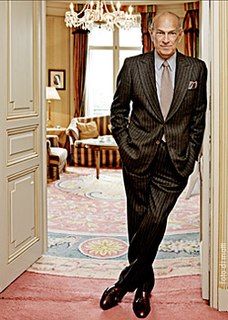A Quote by Lizzie Andrew Borden
I don't know whether Mrs. Borden is out or in; I wish you would see if she is in her room.
Related Quotes
She seemed to know, to accept, to welcome her position, the citadel of the family, the strong place that could not be taken. And since old Tom and the children could not know hurt or fear unless she acknowledged hurt or fear, she had practiced denying them in herself. And since, when a joyful thing happened, they looked to see whether joy was on her, it was her habit to build laughter out of inadequate materials....She seemed to know that if she swayed the family shook, and if she ever deeply wavered or despaired the family would fall.
Poor Mr. Pickwick! ... If he played a wrong card, Miss Bolo looked a small armoury of daggers; if he stopped to consider which was the right one, Lady Snuphanuph would throw herself back in her chair, and smile with a mingled glance of impatience and pity to Mrs. Colonel Wugsby, at which Mrs. Colonel Wugsby would shrug up her shoulders, and cough, as much as to say she wondered whether he ever would begin.
Alice?” She spun toward the door, her skirts whirling softly. “Yes?” she forced out. “Do you know what I am holding in my hand?” “No.” “Care to guess?” “A pitchfork?” she asked in a stilted attempt at levity, hoping to invoke his earlier, playful mood. “No, my dear,” he answered drily. “A key to your room.” “What?”she breathed, aghast. “I should hate to have to use it.” “You have a key to this room?” “Mm-hmm.” She took a step toward the door, panic rising up in her throat. “You’re bluffing!” “Do you wish me to prove it?
Don't we look suspicious, the three of us just sitting here in the car?" Borden asked. We'd look a lot more suspicious if we were all three making out in the car," Jazz said. "What?" she added, when Borden turned and gave her a wide-eyed look. You have no idea what kind of happy place you just took me to." Shut up.
If she took Po as her husband, she would be making promises about a future she couldn't yet see. For once she became his wife, she would be his forever. And, no matter how much freedom Po gave her, she would always know that it was a gift. Her freedom would be not be her own; it would be Po's to give or to withhold. That he never would withhold it made no difference. If it did not come from her, it was not really hers.
In seventh grade I had a magical teacher, her name was Mrs. Fried. She wore only pink, she drove a pink Mustang, and she was half out of her head. But very inspiring. And one day she said, "Take out a paper and pen and write something about peace." For some reason I wrote a poem on Noah - I don't know why I chose Noah - and it turned out it was for a contest for the UN. I ended up winning and reading the poem in front of the UN. I remember Mrs. Fried telling me, "When you write your first book, dedicate it to me." That was like, "Whoa."
The way she told it, she was such a criminal even the most God-fearing church ladies got bored of reporting on her; she did the marketing on Sunday, dropped by any church she liked or none at all, was a feminist (which Mrs. Asher sometimes confused with communist), a Democrat (which Mrs. Lincoln pointed out practically had "demon" in the word itself), and, worst of all, a vegetarian (which ruled out any dinner invitations from Mrs. Snow).
She suffers as a miser. She must be miserly with her pleasures, as well. I wonder if sometimes she doesn't wish she were free of this monotonous sorrow, of these mutterings which start as soon as she stops singing, if she doesn't wish to suffer once and for all, to drown herself in despair. In any case, it would be impossible for her: she is bound.
I wondered about Mrs. Winterbottom and what she meant about living a tiny life. If she didn't like all that baking and cleaning and jumping up to get bottles of nail polish remover and sewing hems, why did she do it? Why didn't she tell them to do some of the things themselves? Maybe she was afraid there would be nothing left for her to do. There would be no need for her and she would become invisible and no one would notice.
The extraordinary woman depends on the ordinary woman. It is only when we know what were the conditions of the average woman's life - the number of children, whether she had money of her own, if she had a room to herself, whether she had help bringing up her family, if she had servants, whether part of the housework was her task - it is only when we can measure the way of life and experience made possible to the ordinary woman that we can account for the success or failure of the extraordinary woman as a writer.
[Mrs. Allen was] never satisfied with the day unless she spent the chief of it by the side of Mrs. Thorpe, in what they called conversation, but in which there was scarcely ever any exchange of opinion, and not often any resemblance of subject, for Mrs. Thorpe talked chiefly of her children, and Mrs. Allen of her gowns.
And so when Mrs. Darling went back to the night-nursery to see if her husband was asleep, all the beds were occupied. The children waited for her cry of joy, but it did not come. She saw them, but she did not believe they were there. You see, she saw them in their beds so often in her dreams that she thought this was just the dream hanging around her still.



































